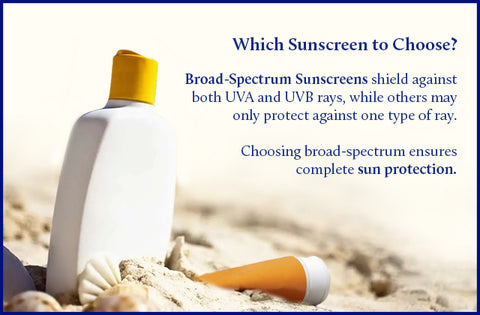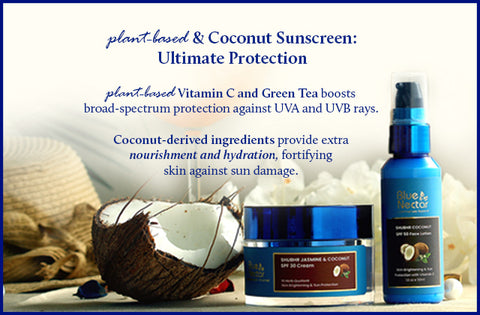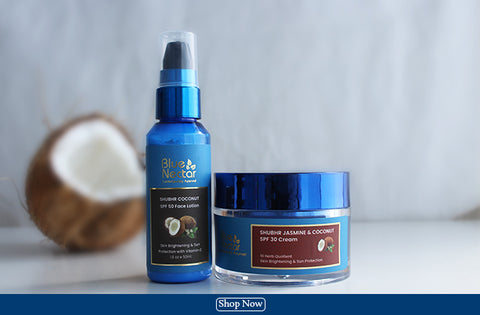Unlocking Broad - Spectrum Sunscreen's Power: Your Best Line of Defence Against UVA and UVB Radiation
| Estimated Reading Time: 7 minutes |
It is essential that we shield ourselves from the sun's damaging rays if we want healthy, glowing skin. Maintaining skin health and avoiding premature aging and sun damage can be greatly aided by knowing the differences between UVA and UVB rays and selecting the appropriate sunscreen.

Table of Content:
|
Does the sunscreen offer protection against both UVA an UVB rays?
Understanding the comprehensive protection offered by sunscreen is vital for safeguarding against the harmful effects of the sun. This includes assessing its effectiveness against both UVA and UVB rays, which are key factors in preventing sunburn, premature aging, and other forms of skin damage.
What are UVA and UVB rays?
UVA and UVB rays are ultraviolet radiation from the sun. UVA ages skin and penetrates deeply, while UVB burns the outer layer and can cause sunburn
Awareness of UVA and UVB Rays
The sun emits two primary forms of ultraviolet radiation, known as UVA and UVB rays. If the skin is not adequately shielded from these rays, they can have different effects and result in different types of harm. It's essential to comprehend the distinctions between UVA and UVB radiation while choosing a sunscreen to protect skin health.
Long-wave UVA radiation is able to extensively penetrate the skin and reach the dermis, which is the deepest layer of the skin. UVA rays are always a threat to skin health, independent of the weather or indoor activities, in contrast to UVB rays, which mainly affect the epidermis, the skin's outermost layer. UVA photons can pass through clouds and glass. Because UVA rays cause the skin's collagen and elastin fibres to break down, they are the cause of skin ageing. Wrinkles, fine lines, and other early ageing symptoms including drooping and lack of suppleness are brought on by this process. A dull and old appearance is further exacerbated by the production of age spots and uneven skin tone, which are also linked to UVA exposure.

UVB rays, on the other hand, are shorter-wave UV radiation that mainly targets the skin's outer layer. They can cause sunburn and have a role in the emergence of skin malignancies, such as melanoma, basal cell carcinoma, and squamous cell carcinoma. At higher altitudes and during the summer, when the atmosphere is thinner and provides less shielding from UV light, UVB radiation is more strong. Even on foggy or overcast days, UVB rays can still reach the atmosphere and do harm. Sunburn, redness, and inflammation appear hours after sun exposure, and the consequences of UVB radiation are usually more noticeable than those of UVA exposure.
Considering that UVA and UVB rays have different effects on skin, it's critical to select a sunscreen that offers complete protection against both UV radiation kinds. Broad-spectrum sunscreens provide more durable and dependable sun protection by efficiently shielding the skin from UVA and UVB radiation. In order to prevent UV rays from penetrating deeper layers of the skin and causing harm, these sunscreens create a barrier of protection on the skin's surface. You can reduce your chances of sunburn, skin cancer, and premature ageing by using broad-spectrum sunscreen in your daily skincare routine. This will ensure that your skin remains healthy and vibrant for many years to come.
Which sunscreen to choose?
Broad-spectrum sunscreens shield against both UVA and UVB rays, while others may only protect against one type of ray. Choosing broad-spectrum ensures complete sun protection.
A broad-spectrum sunscreen will provide your skin with total protection against the entire range of UV rays, however some sunscreens may only block one kind of ray. This is particularly crucial for avoiding long-term harm and lowering the chance of developing skin cancer.

Introducing Sunscreen Made of Plants and Coconuts: The Ultimate Protection
Plant-Based & Coconut Sunscreen: Ultimate Protection
Plant-based Vitamin C and green tea work synergistically to enhance the sunscreen's ability to provide broad-spectrum protection against both UVA and UVB rays. Meanwhile, coconut-derived ingredients offer additional nourishment and hydration, fortifying the skin's natural defences against sun damage.
Plant-based and coconut-based sunscreen provides an all-natural and efficient option for people looking for the best possible UV protection. With the help of components derived from coconuts and botanical ingredients, these sunscreens nourish and hydrate the skin while offering broad-spectrum protection.
One important component of plant-based sunscreen is vitamin C, a strong antioxidant that guards against environmental harm and helps counteract free radicals. Vitamin C strengthens the sunscreen's protective properties against UVA and UVB radiation while also enhancing the general health of the skin when used with green tea extract, another potent antioxidant.
Ingredients made from coconuts, such coconut water and oil, also provide extra skin-benefits. Coconut water hydrates the skin and supports the preservation of its natural barrier function, while coconut oil, which is abundant in vitamins, minerals, and fatty acids, helps calm and moisturise the skin.
The Advantages of Coconut and Plant-Based Sunscreen
Broad-spectrum protection against UVA and UVB rays is only one of the many advantages that plant-based and coconut-based sunscreens offer to the skin. Through the utilisation of organic components sourced from plants and coconuts, these sunscreens offer mild and nourishing treatment appropriate for all skin types, especially those with sensitive and delicate skin.
The mildness of plant-based and coconut sunscreen is one of its main benefits. Because of their renowned ability to soothe and calm, natural ingredients like coconut derivatives and botanical extracts are perfect for people with sensitive or easily irritated skin. Plant-based sunscreens are less likely to induce negative skin reactions than chemical sunscreens, which may contain harsh components that might cause redness, irritation, or allergic reactions. Rather, they function in unison with the skin to offer protective effects that are effective without irritating or uncomfortable.

Furthermore, harsh chemicals and artificial additives are frequently left out of the formulation process of plant-based and coconut sunscreen. Synthetic compounds including oxybenzone, octinoxate, and parabens, which have been connected to possible health risks and environmental harm, are found in a lot of conventional sunscreens. Natural sunscreens, on the other hand, place an emphasis on pure, ecologically friendly formulas made with components derived from plants that are both environmentally benign and sustainably obtained. Customers can lessen their influence on the environment and limit their exposure to dangerous chemicals by selecting sunscreen choices made of plants.
Furthermore, coconut and plant-based sunscreens provide skin with moisturising and nourishing properties. Rich in vitamins, minerals, and fatty acids, coconut-derived products like coconut oil and water support skin hydration and restore its natural barrier function. Long-term sun exposure can cause dehydration and dryness, but these substances act to seal in moisture.
Plant-based sunscreens help to preserve skin health and vitality by hydrating and nourishing the skin, leaving it feeling supple, smooth, and soft.
Additionally, plant-based compounds' antioxidant qualities aid in shielding the skin from oxidative stress and free radical damage. Free radicals, unstable chemicals that can damage cells and hasten ageing, are neutralised by antioxidants including vitamin E, green tea extract, and grape seed extract. Plant-based sunscreens contribute an extra layer of protection against environmental aggressors by adding antioxidants into their formulations, which helps to preserve the skin's youthful appearance and delay the ageing process.
All things considered, broad-spectrum sunscreen made of plant-based and coconut oils offers a comprehensive approach to sun protection by moisturising and feeding the skin with natural components. Customers may get excellent sun protection without sacrificing environmental sustainability or skin health by selecting natural sunscreen solutions. Plant-based sunscreen is the best option for people who want to protect their skin while leading a clean and conscientious lifestyle because of its mild and environmentally friendly compositions.

Results
It is more crucial than ever to protect your skin from the damaging effects of UV radiation in today's sun-conscious society. You can protect your skin from sunburn, premature ageing, and the risk of skin cancer by using a broad-spectrum sunscreen that blocks both UVA and UVB radiation.
The best protection against the sun's harmful rays is provided by plant-based and coconut-based sunscreen, which nourishes and hydrates skin while providing broad-spectrum protection. This sunscreen's powerful formula and natural ingredients make it an excellent option for anyone who want to protect their skin and adopt a more sustainable, healthy lifestyle.
Recommended Products by Blue Nectar:
Niraa Shea Butter SPF 30 Face & Body Lotion | Skin Brightening & Sun Protection
Shubhr Women's Eladi Day Face Cream with SPF 30 | Skin Brightening & Sun Protection






















Leave a comment